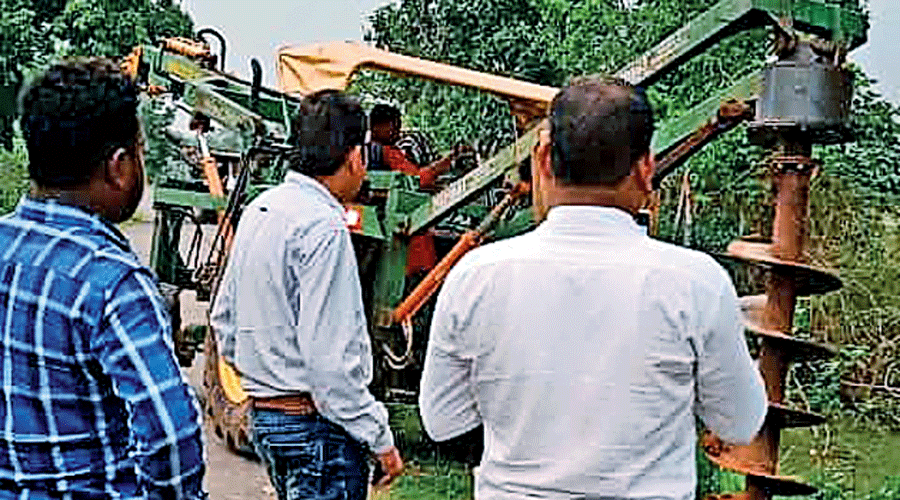It has taken Droupadi Murmu’s nomination as the presidential candidate for a tribal locality in her ancestral village to get electricity connections, 75 years after Independence.
Dungurisahi, home to 15 below-poverty-line families, is part of the tribal village of Upper Beda in Mayurbhanj district, where Murmu’s ancestral house is located. But Dungurisahi is separated by half a kilometre from the main village, whose 1,400 residents received power connections “20 or 30 years ago”.
These 500 metres had been a bridge too far for the power authorities. Until the NDA last Tuesday declared Murmu, 64, as its nominee for the July 18 presidential polls, which she is the firm favourite to win.
Four days after the announcement, work began to set up power connections in Dungurisahi.
“Electrification work has been going on since Saturday,” junior engineer (electrical), Kusumi Block, M. Prasad Rao said. “We worked till late in the night on Saturday. We hope to give power connections to the hamlet by Monday.”
People in Dungurisahi, many of whose 50-odd residents claimed they were related to Murmu, said they were happy at getting electricity.
None seemed aggrieved that it had taken a presidential nomination to secure a basic facility, after years of fruitless application to local authorities.
“I’m excited that our hamlet will get electricity,” Biranchi Narayan Tudu, 32, a nephew of Murmu, told The Telegraph. “Since there was no power connection, we used to go to sleep early and woke early in the morning.”
Dungurisahi residents said they had begun applying for power connections only after Murmu became Jharkhand governor in 2015 — suggesting a resigned acceptance of neglect and deprivation as the natural order, rather than a desire to assert one’s rights.
This lack of “political consciousness” generally among tribal people helps perpetuate their exploitation, said Gurva Soren, 72, tribal activist and former director of the Odisha Mineral Bearing Areas Development Corporation.
“Tribal people are being exploited across the country because they are a minority and lack political consciousness,” Soren said.
If Dungurisahi highlights the importance Murmu’s nomination for President holds to many of her tribal brethren, it also perhaps underscores the challenges she faces in getting tribal rights implemented across the country — as many activists are hoping she would.
Bhakatabandhu Tudu, a cousin of Murmu, told this newspaper: “It’s because of my sister’s efforts that concrete roads connect each part of the village, even Dungurisahi.”
He added without any apparent sense of resentment: “She had also raised the issue of power connection several times, but it’s only after her name has been announced for President that work has begun.”
Before becoming Jharkhand governor, Murmu had been a minister in Odisha from 2000 to 2004 when the BJP was an ally of the ruling Biju Janata Dal.
Dungurisahi has no water supply, either, while the piped water supplied to the rest of Upper Beda is irregular.
Bhakatabandhu said: “Our sister is going to be President of India. I hope all the basic needs of the area will be taken care of now.”
Asked why Dungurisahi had been denied electricity all these years, junior engineer Rao said: “It is around half a kilometre from the main village. Earlier, it had only 5-6 houses but the number has grown to 15 in the last seven years. We planned to give power connection to the hamlet even if it was slightly late.”
Murmu’s presidential nomination has had another fallout: the state PWD has begun a project to convert the 15km road from Pahadpur — where Murmu has set up a school — to the nearest town, Rairangpur, into a double-lane one.
Pahadpur, 6-7km from Upper Beda, is the village of Murmu’s in-laws. She had established the school for students of Classes VI to X in 2016 in memory of her three children and husband whom she had lost over the years to disease and accident.
“This is a residential school with more than 100 students,” Muna Pratihari, who manages the school, said. “She (Murmu) donated four acres of land for the school.”
Murmu visits Pahadpur on August 1 every year to attend the Shradha Diwas of her husband, who passed away in 2015. “We are expecting her on August 1 this year too,” Pratihari said.










